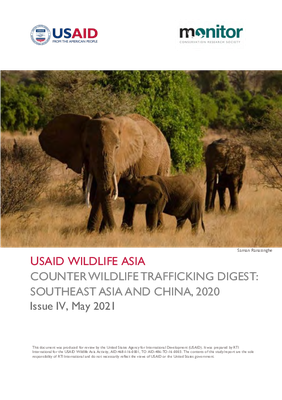New USAID Counter-Wildlife Trafficking Digest Reveals a Steep Decline in Reported Seizures
In 2020, the effects of COVID-19 and related national lockdowns, travel restrictions, and trade suspensions caused a steep decline in reported seizures compared to 2019. Seizures of illegal wildlife in 2020 resulted in approximately 10,000 kilograms (kg) of pangolin products, 506 kg of ivory, 5.5 kg of tiger products, and 222 kg of rhino horn. All seizures’ volumes except for the rhinoceros -- which declined the least, but still significantly by 56 percent -- were exponentially lower than the numbers cited in the 2019 CWT Digest.
This year’s digest also provides information on the arrests and prosecutions that followed the seizures, noting a total of 202 suspects arrested and eight convicted.
The 4th CWT Digest also noted the following trends:
- Ivory and pangolin products are now predominantly trafficked from West and Central African countries. Transnational wildlife crime syndicates have reportedly shifted their focus on these countries due to the lax enforcement and weak governance there.
- Trade in ivory catering to Chinese clientele in neighboring Cambodia, Japan, Thailand, and Vietnam have increased after China’s domestic ivory trade ban in 2018.
- The commercial trade in captive tigers is further exacerbating the threat to wild tigers as it persists, despite a 2007 CITES Decision being passed to phase out tiger farms.
- In Vietnam, the number of wildlife trafficking cases resulting in prosecution had risen (from 86.7 percent between 2015 and 2019, to 97.2 percent) in the first six months of 2020 while the number of arrests resulting in prison sentences also increased (from 48 percent in 2018 and 2019 to 68 percent in 2020) as well as the length of these sentences.
“Our partnership with USAID Wildlife Asia has helped us address and elevate wildlife crime as a serious transnational crime. Wildlife trafficking poses a growing threat to the region’s security and prosperity, and ASEANAPOL is strengthening its counter-wildlife trafficking efforts as countries in the region are increasingly working together to fight wildlife crime,” said ASEANAPOL Secretariat Executive Director, Deputy Assistant Commissioner Jim Wee, during the launch.
The digest highlights regional efforts to counter the illegal wildlife trade in 2020: approval of the Plan of Action on ASEAN Cooperation on CITES and Wildlife Enforcement 2021-2025; social and behavior change campaigns effectively reducing the demand for illegally and unsustainably sourced animals; improved legal enforcement in Cambodia, China, Lao PDR, Thailand, and Vietnam to better understand the illegal wildlife trade flows and dynamics. The digest also included preliminary assessments of the impact of COVID-19 on poaching and wildlife trade around the globe. Coupled with a series of high-profile seizures, arrests and prosecutions, these developments have moved the international community closer to understanding, tackling, and disrupting criminal syndicates and traffickers.
To download a copy of the digest, please visit https://www.usaidwildlifeasia.org/resources/reports/inbox/cwt-digest-2020/view


